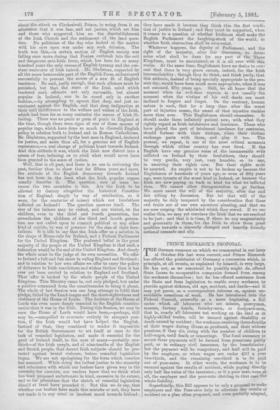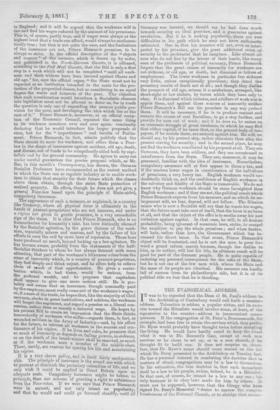PRINCE BISMARCK'S PROPOSAL.
THE German rumours on which we commented in our issue of October 9th last were correct, and Prince Bismarck has offered the proletariat of Germany a concession which, in principle, at all events, as explained by himself, is very large. He has not, as we conceived he possibly might do, offered State Loans to co-operative companies formed from among the workmen themselves ; but he has offered assistance from the State and from legislation to enable every workman to provide against sickness, old age, accident, and death—and it may yet prove, as a correspondent informs us, against un- avoidable cessations of work. He has introduced into the Federal Council, avowedly as a mere beginning, a Bill under which all labourers who are miners, quarrymen, masons, factory hands, foundry-men, or dockyard-men, that is, nearly all labourers not working on the land or in highly-skilled trades, will be insured against disability or death caused by accident ; the workmen receiving three-fourths of their wages during illness so produced, and their widows pensions, if they die, rising with the number of children to half-wages, until death or remarriage. The fund necessary to secure these payments will be formed from premiums partly paid, as in ordinary civil insurance, by the beneficiaries ; but the payment will be compulsory, and half will be paid by the employer, or when wages are under 37 a year two-thirds, and the remaining one-third is to be paid out of poor-rates. In other words, the workman is to be ensured against the results of accident, while paying directly only half the value of the insurance ; or if a poor man, none at all, the employer and the poor-rate dividing in that case the whole liability. Superficially, this Bill appears to be only a proposal to make employers and the Poor-rate help to alleviate the results of accident on a plan often proposed, and even partially adopted,
in England ; and it will be argued that the workman will in the end find his wages reduced by the amount of his premiums. This is, of course, partly true, and if wages were always at the highest level that a trade can afford, would always be mathema- tically true ; but that is not quite the case, and the limitations of the insurance are not, Prince Bismarck promises, to bo always so strict. In the official description of the " objects and reasons" of the measure, which is drawn up by order,
and published in the North-German Gazette, it is affirmed, acoording to the Pall Mall Gazette, that the Bill is only a first step in a work which will not be completed " until all work-
men and their widows have been insured against illness and old age," for, says the official organ, " the State must not be regarded as an institution intended in the main for the pro- tection of the propertied classes, but as considering in an equal degree the wants and interests of the poor. The objection that such consideration would introduce a Socialistic element into legislation must not be allowed to doter us, for in truth the question is only one of expanding the present public pro- vision for the poor, and developing the idea which lies at the root of it." Prince Bismarck, moreover, at an official recep- tion of the Economic Council, repeated the same thing to its workmen members over and over again, constantly declaring that he would introduce his larger proposals at once, but for the " impertinence " and insults of Parlia- ment. Prince Bismarck, in fact, admits publicly that the State should do more for workmen, and offers them a Poor- law in the shape of insurances against accident, old ago, death, and disease, out of funds to be compulsorily aided both by capi- talists and by the general community. He agrees to carry out
under careful guarantees the precise proposal which, as Mr. Rae, in this month's Contemporary, has shown, the German
Socialist Professors have recommended as the easiest method in which the State can so regulate industry as to enable work- Men to obtain that security for their future which the classes above them obtain, through the strict State protection of realised property. He offers, though he does not yet give, a general Poor-law based upon the principle of State-aided, compulsory insurance.
The appearance of such a measure, so explained, in a country 111re Germany, where all physical force is ultimately in the hands of peasant-proprietors who are not insecure, and under a regime not given to gentle promises, is a very remarkable sign of the times. It is clear that Prince Bismarck, who is no humanitarian for humanity's sake, has been distinctly alarmed by the Socialist agitation, by the grave distress of the work- Men, especially miners and masons, and by the failure of his efforts to cure the evil by mere laws of repression. Those laws have produced no result, beyond locking up a few agitators. He has become aware, probably from the statements of the half- Socialist thinkers to whom ho has always listened with some attention, that part of the workmen's bitterness arises from the sense of insecurity which, in a country of peasant-proprietors, they feel deeply and think unjust, and he offers help to relieve them of much of that apprehension. He gives a contri- bution which, in bad times, would be serious, from the pational wealth, and he proposes that capitalists shall appear to give one more serious still. He is pro- bably not aware that an insurance, though nominally paid by the employer, must really come out of the workmen's wages ; or, if aware of the truth, he hopes that, like the majority of Civil servants, clerks in great institutions, and soldiers, the workmen will forget the argument, and regard pension as a liberal con- cussion, rather than as merely a deferred wage. He hopes by his present Bill to create an impression that the State thinks benevolently of workmen who suffer—regards thorn, in fact, as wounded soldiers in the Army of Industry—and, by his offers for the future, to interest all workmen in the success and con- tinuance of his rigime. If he lives and rules, he promises that BO much of insecurity as depends on failing powers, on sickness, or on the death of the bread-winner shall be removed, as much as if the workman were a member of the middle-class. Those, surely, aro reasons for sparing his life and maintaining his regime.
It is a very clever policy, and in itself fairly unobjection- able. The principle of insurances is the sound one with which to prevent or diminish the pecuniary calamities of life, and wo only wish it could be applied in Great Britain upon an adequate scale. Compulsory insurance might be better, in principle, than our scheme of granting a right to subsistence from the Poor-rates. If we were sure that Prince Bismarck were in earnest, and not only intent on popularity, and that he would and could go forward steadily, until all
Germany was insured, we should say he had done much towards securing an ideal poor-law, and a guarantee agaioat revolution. But if he is seeking popularity, there are two
difficulties in his path which he may not have sufficiently estimated. One is, that his measure will not, even as inter-
preted by his promises, give the great additional Sense of security to the proletariat that he imagines. Like almost all men who do not live by the labour of their hands, like many even of the professors of political economy, Prince l3ismaareir forgets that the great causes of insecurity for workmen are not sickness, or old age, or death, but dismissal or failure of employment. The lower workmen in particular fear sickness very little, unless exceptionally provident ; they dread the pecuniary results of death not at all ; and though they dislike the prospect of old age, esteem it a misfortune, arranged, like
short-sight or low stature, by forces which they have only to obey. It is dismissal which irritates, and a failure of work which appals them, and against these sources of insecurity neither Prince Bismarck's Bill nor his promises in any way protect them. It will be necessary, if ho is to produce content and remove the causes of real Socialism, to go a step further, and provide for men out of work ; and if lie does so, he enters on an economic struggle of great virulence, in which he may find that either capital, if he taxes that, or the general body of tax- payers, if he mulcts them, are arrayed against him. He will, we should say, by his present step, rather stimulate than allay the present craving for security ; and in the second place, he may not find the workmen conciliated by his proposal at all. They are Germans, they have been soldiers, and they are accustomed to interference from the State. They are, moreover, it may be presumed, familiar with the idea of insurance. Nevertheless, compulsory assurance will at first appear to them a tax, and if the masters lower wages in consideration of the half-share of premiums, a very heavy tax. English workmen would un- doubtedly think so, and the confidence of English workmen in the solvency and fidelity of the State is immovable. We do not know why German workmen should be more far-sighted than English workmen ; and if they are not, the political result which Prince Bismarck expects from his measure, and on which its en- largement will, we fear, depend, will not follow. The Silesian miner who is now a Socialist will say that he wants his wages, that the future must take care of itself, that the boon is no boon at all, and that the object of the offer is to soothe away his just irritation against capital. In that case, he will, in all human probability, being ignorant of economic laws, strike, to compel the employer to pay the whole premium ; and when beaten, will hate, rather than love, the Government which has in-
creased his direct taxes. In that event, Prince Bismarck's object will be frustrated, and he is not the man to press for- ward a grand reform merely because, though the dislike to
him, as its author, will last his life, its ultimate result will be good for part of the German people. He is quite capable of
enduring any personal consequence for the sake of the State, but he is not one of the few men with whom the State and the mass of its people are identical. His measure can hardly fail of success from its philanthropic side, but it is of its political side we fear that he is thinking.



































 Previous page
Previous page